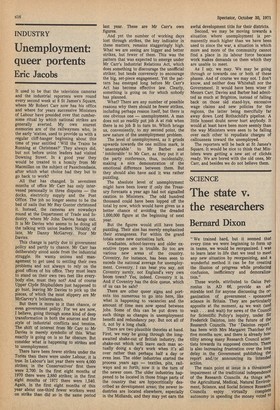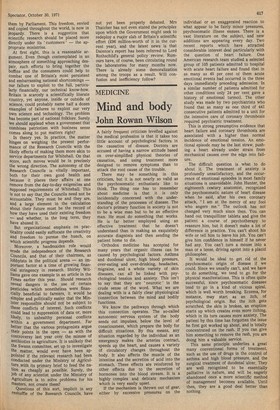The state v.
the researchers
Bernard Dixon
" We trained hard, but it seemed that every time we were beginning to form up in teams, we would be reorganized. I was to learn later in life that we tend to meet any new situation by reorganizing, and a wonderful method it can be for creating the illusion of progress while producing confusion, inefficiency and demoralization."
These words, attributed to Gaius Petronius in AD 66, provide an admirable text for anyone discussing the organization of government sponsored science in Britain. They are particularly apposite at the moment, as we wait (and wait. . . and wait) for news of the Council for Scientific Policy's inquiry, under Sir Frederick Dainton, into the future of the Research Councils. The Dainton report, has been with Mrs Margaret Thatcher for five months now, and there is already hostility among many Research Council scientists towards its supposed contents. There is also increasing frustration over the long delay in the Government publishing the report and/or announcing its intended action. The main point at issue is a threatened impairment of the traditional independence of the Research Councils. As things are, the Agricultural, Medical, Natural Environment, Science, and Social Science Research Councils enjoy virtually complete autonomy in spending the money voted t° them by Parliament. This freedom, envied and copied throughout the world, is now in jeopardy. There is a suggestion that scientific research should be placed more directly under its customers ' — the appropriate ministries.
At first sight, this is a reasonable argument. Even though contemplated in an atmosphere of something approaching des Pair, such efforts to bring together the boffins and the consumers could help to combat one of Britain's most persistent and embarrassing national shortcomings — our failure to exploit to the full, particularly financially, our technical know-how.
Britain is scarcely a scientifically literate country, yet anyone, inside or outside of science, could probably name half a dozen examples of failures to exploit our very own science and technology. The problem has become part of national folklore. Surely we should applaud when a government that combines patriotism with business sense comes along to put matters right?
In theory yes. In practice, the matter hinges on weighing the present perfor mance of the Research Councils with the likely effects of making them more akin to service departments for Whitehall. On that score, such moves would be in precisely the wrong direction. The autonomy of the Research Councils is vitally important, both for their own good health and because it places their affairs at one remove from the day-to-day exigencies and supposed requirements of Whitehall. This Is not to say that,the Councils need not be accountable. They must be and they are, and a large element in the calculation about their future must be the record of how they have used their existing freedom — and whether, in the long term, they have abused it.
But organizational emphasis on practicality could easily suffocate the creativity and freedom to pursue the hunch, on Which scientific progress depends.
Moreover, a handmaiden role would erode the independence of the Research Councils, and that of their chairmen, as lobbyists in the political arena — an imPortant factor at a time of growing finan cial stringency in research. Shirley Wil liams gave one example in an article in the Turtles earlier this year. Should research reveal dangers in the use of certain Pesticides which nonetheless were financially beneficial to farmers, it would be simpler and politically easier that the Min ister responsible should not be subject to these conflicts of interest. Such conflicts could lead to suppression of data or, more likely, to unhealthy personal conflicts Within a government department. Far better that the various protagonists argue their points in the open — as with the controversy last year over the misuse of antibiotics in agriculture. It is unlikely that the Swann committee, set up to investigate the matter, would ever have been ap pointed if the relevant research had been conducted under the Ministry of Agricul ture with its primary brief to feed the nation as cheaply as possible. Surely, the Job of any scientist under the Ministry of Agriculture is to solve problems for his masters, not create them?
Questions of this sort, implicit in any reshuffle of the Research Councils, have not yet been properly debated. Mrs Thatcher has not even stated the principles upon which the Government might seek to redeploy a major slab of Britain's scientific effort (£96 million-worth of it in the current year), and the latest news is that Dainton's report has been referred to Lord Rothschild's general policy review. Rumours have, of course, been circulating round the laboratories for many months now. There is already some demoralization among the troops as a result. Will confusion and inefficiency follow?



































 Previous page
Previous page